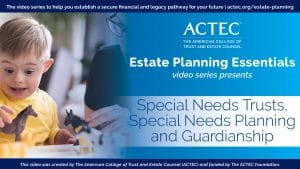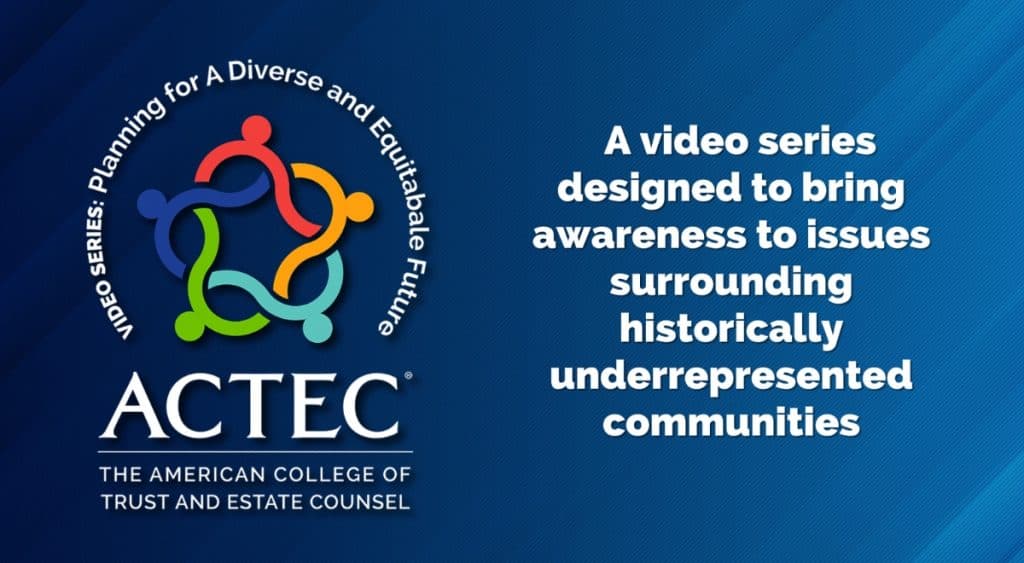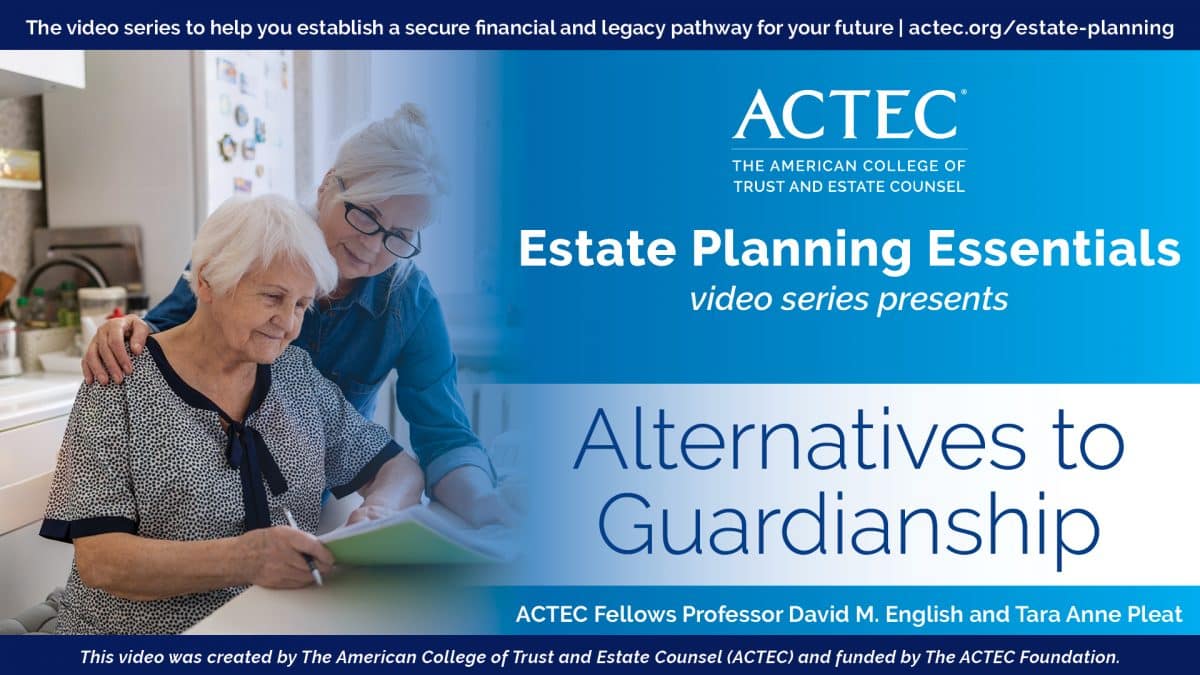Transcript
Introduction
ACTEC Fellow Terrence M. Franklin: The Americans with Disabilities Act, which was enacted in 1990, was a pivotal civil rights law for individuals with mental and physical conditions. As a society, we have come a long way towards mindfulness and inclusivity, but there’s still progress to be made. Today, ACTEC Fellows David English and Tara Pleat share their knowledge and discuss supportive legal options that help individuals live as independently as possible.
Professor David M. English: Tara, when we have an individual who has a disability, how can they go about maximizing their potential, and how can family members help them in that effort?
Maximizing Potential of a Disabled Person
Tara Anne Pleat: I think probably the very first thing to address is the fact that when you are working with a family who has a family member who is disabled – and often, this conversation will begin when we’re talking to somebody who has a younger child with a disability, and they’re reaching the age of maturity, and there’s concern about how that person is going to make decisions, how they’re going to be protected, how there will be advocacy for that person.
And often, practitioners, school districts, doctors’ offices, will advise families that they should be considering guardianship for that individual. Depending upon what state you’re in, that guardianship can be something that effectively strips an individual of their rights in their entirety if that guardianship is based upon their disabling condition. And in other states, there are more tailored types of guardianships.
But from our perspective, I think the most important thing for people to know on the front end of these kinds of decisions is that there are
alternatives to guardianship. There are other tools that can be utilized that will give an individual the right to self-determine and make their own decisions, either with support or with assistance from other family members. But those alternatives should be at the forefront of conversation with families.
And frankly, I’m focusing on the younger disability population, but the same is true for seniors who enjoyed capacity during their lifetime, and now begin to suffer from diminishing capacity.
One of the concepts I think is important to understand at the front end of this – We all understand what self-determination is, right? The right to make our own decisions, to participate in our own decision-making. But the concept of dignity of risk, which is one that is fairly well-known in the disability community, and certainly among disability service providers, is the ability of a person, not only to make their own decisions, but to enjoy the successes and enjoy the failures of those decisions.
We have for so long, in this country, served in a protective role, in a paternalistic role, and understandably so, coming from a good place, I think, without recognition of the fact that that overprotection or that paternalism really prevents people from enjoying human dignity at its core. Enjoying successes, but enduring failures is a part of life for everybody, and there’s no reason that that shouldn’t be the case for a person simply because they have a disability diagnosis.
In that vein, there’s been a movement around the country over the last several years, discussing a new alternative to guardianship, at least new in the U.S., of supported decision-making. David, can you give an understanding of what that is and how it’s intended to work?
Alternatives to Guardianship
Professor David M. English: I’d be happy to.
Supported decision-making really originated in Europe a number of years ago, but it has become very prominent in the United States in the last five, six years, or thereabouts. The idea of supported decision-making is the individual with a disability will continue to make their own decisions. This is not a type of guardianship, where someone else will step in. But just like all of us need support when we’re getting our car repaired, or doing other technical things like fixing our computers, for many of us, an individual with a disability needs support as well in making day-to-day decisions.
And so, the idea of supported decision-making is the individual with the disability will be surrounded by a circle of professionals, family members, and so on, who will agree in advance to support the individual in making their own decisions. Not they’re making in the decisions for the individual, but the individual will continue to make their own decisions. And supported decision-making can be informal, but it can also be formal, where the parties, both the individual with the disability and the supporters will sign a formal agreement.
Supported decision-making has been recognized by statute in an increasing number of states, but you don’t need a state statute to do supported decision-making. So, in Missouri, where I am from, supported decision-making is being increasingly used, even though we don’t have a state statute exactly on point.
Supported decision-making has been used mostly for younger individuals with disabilities, but it also holds promise for older individuals who may have had full capacity, but now are of declining capacity. But for individuals who have full capacity, and are concerned about the future, it is very important that they plan today for possible future incapacity. And so, when we talk about planning for future incapacity, there are healthcare issues and property issues.
And Tara, could you tell us perhaps some of the steps someone might today consider about planning for healthcare in the future if they should lose capacity?
Planning for Incapacity
Tara Anne Pleat: Certainly. Most states in the U.S. have statutes that deal with the appointment of an agent to make healthcare decisions for a person if they lose capacity down the road. Those are often referred to as healthcare proxies, durable powers of attorney for healthcare, and, I think, in some states, even healthcare surrogates.
But the purpose of that document, and it is a document. It typically needs to be witnessed by a couple of uninterested and unrelated individuals. But it’s a document where you are deciding if you lose capacity down the road and you are incapable of making your own healthcare decision, who you are going to have a stand in your shoes and be your voice to your healthcare providers at that point in time.
The healthcare proxy document is not effective when it is signed, it’s effective at the time a physician that is either treating or attending makes the determination that you, as the patient, are no longer able to understand the decisions you’re being asked to make and the consequences of those decisions. In some cases, that’s an easy judgment call, right? A person is under general anesthesia. In others, it’s not so easy, where there is diminished or diminishing capacity of a particular patient.
But the idea there is that you get to say today, when you are competent and right-minded, that you want a particular person to be in that role, whether that person is your spouse, a child, or a friend. It is who you are choosing to be your voice, and I think that’s important for people to understand.
I always will say to our clients that if you don’t make this choice now, maybe your state has a statute that creates a hierarchy, and it’s not going to appoint the person you want, or maybe your state doesn’t, and in fact, instead, a judge is going to be the determiner of who is going to be your voice when it comes to healthcare decisions. So, if you have the ability to make that choice now, make it. And you can change it down the road. Those documents are easily revocable if your feelings change, or family circumstances change.
The other document that goes along with healthcare proxy, or sometimes they’re combined into a single document, is a document often referred to as a living will. Some states have statutes about the formality of those, and states like mine, New York, acknowledge their existence, but we don’t have any statutory formality to what that document needs to look like.
What its intention is, however, is to provide evidence of what a patient’s wishes would be in an end-of-life circumstance. And often, those end-of-life circumstances are focusing on a time when a person is in a persistent vegetative state, where they’re not enjoying any or very minimal brain function, but their body is still living. Their body is still functioning. Or if a person has a terminal condition, which is generally defined as having a prognosis of less than six months to live, and then something else happens that’s going to bring on the end of their lifetime.
That
living will document is the evidence of what a patient’s wishes would be when it comes to end-of-life decision-making, and really serves as a guide for the healthcare agent, for both the healthcare provider, but the agent who is charged with being the voice of that patient.
So, those documents are documents that we’re often talking with clients about in planning for the potential future incapacity as it relates to healthcare decisions.
There’s also
medical orders that patients can discuss with their doctors, whether it’s a specialist, or a primary care physician, or maybe it’s an attending physician in a hospital, that are known as Medical Orders for Life-Sustaining Treatment; the acronym is MOLST. Physician Orders for Life-Sustaining Treatment acronym is POLST. Same document, they’re just called different things in different states.
And that document is intended to be completed by the patient or the patient’s agent, and the treating physicians dealing with the particular affliction the client is facing at that point in time. And it is very specific about do not resuscitate, do not intubate, what types of treatments might you want in this circumstance.
Lawyers can’t create those documents; we can only talk about them. They’re physician’s orders that have to be signed by a physician and entered into the patient’s chart, for clients who are facing terminal prognoses, or prognoses where we know there is going to be a diminution in their cognitive capacity. It’s a document we’ll talk to clients about and suggest perhaps they discuss with their physicians.
With respect to healthcare, that’s kind of the gamut. The only other document I would suggest possibly is a HIPAA authorization, which is the authorization to give an individual access to your protected medical information, whether or not you have lost capacity. So, that’s a different kind of discussion, but that’s out there.
With respect to property, however, David, what are the tools that people will utilize when they’re planning for potential incapacity, and they’re concerned about their assets or their real estate?
Property and Planning for Incapacity
Professor David M. English: The key document that an individual should consider signing is called a
power of attorney. Terms vary. It’s called power of attorney for property some places, power of attorney for financial management in others. And the basic concept is the individual, in advance, in the document, will designate an agent or attorney-in-fact. The states vary on the terms.
And it’s very similar to the healthcare power of attorney or proxy that Tara talked about. The agent or attorney-in-fact will be powered to make decisions, sometimes immediately, other times when the individual loses capacity. And unlike the healthcare power of attorney, the power of attorney will list various property and financial transactions that the agent or attorney-in-fact can handle. This can include signing income tax returns, applying for government benefits, selling property, changing investments, and so on.
In signing the power of attorney, it’s important to seek counsel because these are not easy documents. It’s very important also to think about successors, both for the property power of attorney and for the healthcare power of attorney or proxy because the individual whom you name first to take the role of agent or attorney-in-fact might not be available at a later point.
Also, finally, it is very important for all of these documents for the individual to talk to the agent or attorney-in-fact that they have named, to make certain the individual will agree to take on the job if they’re able to do so. And also, these documents are, even though there’s an effort to write them in plain English, that’s kind of lawyer plain English, which is not as plain as perhaps it should be. And so, it’s very helpful if the individual has a conversation with the agent, proxy, and so on, as to what they really want, what their true wishes are, so that the person when they make the decision is much better informed.
ACTEC Fellow Terrence M. Franklin: We appreciate the information and resources that ACTEC Fellows David English and Tara Pleat shared. In addition to this series, ACTEC has a library video available from supported decision-making to power of attorney at actec.org slash estate dash planning. Take the time to educate yourself about disability rights so you can be an advocate.

 Special Needs Trusts, Special Needs Planning and Guardianship: A curated topic of Estate Planning Essentials videos. Planning for minors and adults with diminished capacity requires careful consideration of the applicable laws. Experts in estate planning and this area of the law offer their expertise to families regarding special needs trusts, Supported Decision-Making (SDM), alternatives to guardianship, healthcare proxies, power of attorney and more.
Special Needs Trusts, Special Needs Planning and Guardianship: A curated topic of Estate Planning Essentials videos. Planning for minors and adults with diminished capacity requires careful consideration of the applicable laws. Experts in estate planning and this area of the law offer their expertise to families regarding special needs trusts, Supported Decision-Making (SDM), alternatives to guardianship, healthcare proxies, power of attorney and more.

